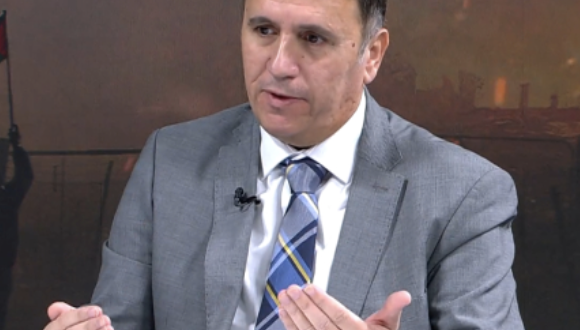Dr. Shehab Al Makahleh
For the past six months, Jordan has been facing the aggression against Gaza, and it has spared no effort in supporting the people of Gaza, confronting the aggression and the Israeli narrative. Jordan has provided humanitarian, political and diplomatic aid, taken measures against the occupation, and exerted pressure on countries that are influential or even allied with Israel. These efforts continue to this day.
Jordan has been transparent and honest, avoiding empty promises or unrealistic claims. It did not make grandiose statements about invading Tel Aviv or use misleading names for missiles, as some of Hamas’s allies did.
When the aggression took place, these countries retreated, prioritising their own interests with America, and failed to provide significant support to Gaza. Jordan, on the other hand, has maintained its open arms towards Hamas and consistently advocated for the Palestinian cause.
Jordan is a sovereign state, not a subsidiary of any organisation. It has its own priorities and interests, and it is responsible for preserving the normal lives of its people while standing in solidarity with its brothers.
Jordan will not jeopardise its state and its people for the benefit of any organisation or reckless adventurers.
Jordan has not fallen short in its support for its brothers. It has taken every initiative to provide relief to them, utilising both land and air routes. Jordan continues to work tirelessly to stop the war.
The question that needs to be asked is whether other countries, even those claiming to be allies of Hamas or acting as incubators for the Brotherhood, have done more than Jordan in supporting the Palestinian cause.
Jordanians of diverse origins stand united in support of Palestine, its beliefs and the people of Gaza. This sentiment is shared by many Jordanians, representing a wide range of backgrounds and heritage.
It is imperative to uphold these positions without the need for apologies or justification. This is especially relevant when discussing the situation in Jordan.
It is unreasonable to subject the country to perpetual examination, wherein patriotic certificates are arbitrarily distributed or revoked, without any justifiable cause.
In times of crisis, a universally accepted principle states that if a fire breaks out in your twin brother’s house, located adjacent to your own, it is incumbent upon you to stand in solidarity and help extinguish the fire. It would be illogical and against ethical norms for you to set your own house ablaze or allow the fumes of the fire to permeate your dwelling. This principle holds true, and it is one that any rational person would adhere to.
In recent times, there has been a gradual escalation of tensions in Jordan. It almost appears as if there is a deliberate attempt to drag the country into a state of war by manufacturing internal crises linked to the situation in Gaza. Despite Jordan’s approval of marches and demonstrations since October 7, conducted in accordance with legal standards, there are concerted efforts to create turmoil.
Jordan has been actively facilitating popular relief campaigns, being the first to establish an air corridor for aid delivery and spearheading a global political campaign to engage with world leaders and influential capitals, urging them to halt the war. Jordan recognises the immense cost, as well as the security and strategic risks associated with the conflict.
One cannot help but question why Jordan is subject to incessant scrutiny, while other Arab and Islamic countries seem exempt from similar scrutiny. Why is Jordan burdened with the weight of complex crises, as if there is an intention to tarnish its reputation, belittle its standing and unfairly shift blame onto the country? It is crucial to acknowledge the open plans by the Israeli right, targeting Jordan and seeking to sow chaos. Such plans can only lead to a state of open and bloody chaos.
While there may be individuals within Jordan, representing various backgrounds and origins, who are involved, knowingly or unknowingly, the overall cost is grave.
Some individuals believe that destabilising Jordan internally is the solution to the situation in Gaza. However, it is evident that popular revolutions have not succeeded, unfortunately, neither in Jerusalem, the West Bank, nor the territories occupied in 1948. Therefore, the feasibility of a revolution in Jordan remains questionable.
Addressing the daily escalations that may lead the country down an undesirable path necessitates maintaining a calm approach.
Avoiding confrontations, preventing acts of betrayal, refraining from belittling the country and ceasing attempts to create internal crises are paramount. While the right to demonstrate is guaranteed, it should be exercised within acceptable limits. Establishing a “fiery core” that could transform an internal crisis into a catastrophe must be avoided.
Many individuals raise concerns about hidden agendas, infiltrators, foreign-managed electronic campaigns and even instructions to disrupt Jordan internally. These claims often elicit critical reactions, and they are not universally accepted. Instead of delving into these discussions, it is crucial to focus on the overall cost to Jordan and its stability. A careful evaluation of who stands to benefit or suffer if the situation spirals out of control is of utmost importance, especially in light of plans to reshape the entire region.
The current situation in Jordan is neither acceptable nor natural, as the enemy is not Jordan itself. The enemy is specific and clear. The demands put forward by the Palestinian cause are legitimate and have been reiterated numerous times. However, managing the situation calls for a careful assessment of who stands to benefit or suffer if things go awry.
Palestinians consider Jordan their gateway in this world. It is imperative for those who claim to support Palestine to understand that the logical response is not to spread the fire to Jordan. The field resistance within the Gaza Strip itself recognises who its true enemy is. Therefore, it is crucial for all forces to consider the timing and approach the situation with rationality, ensuring Jordan’s safety and preventing any misinterpretations.
Two questions remain: Is it reasonable to seek revenge on Israel by transferring the confrontation to Jordan? And do some of us truly comprehend the geopolitical challenges faced by Jordan and the associated costs? These questions demand thoughtful consideration, as the answers will shape the path forward for Jordan and its role in supporting Palestine while maintaining stability.
We must take pride in our valiant security forces and recognize their crucial role in protecting us, safeguarding the nation, and ensuring our comfort. Any attack on them is an attack on us and the entire nation, as their sacrifices for Palestine on its soil are known to everyone. They have written championships and set examples of upscale human interaction. They are our sons and daughters, born from us and within us. They are deeply affected by what hurts us, and what matters to us is of utmost importance to them. We share the same heart, stand together in the same trench, and fight for the same cause.
Jordan remains committed to its principles and continues to navigate a complex geopolitical landscape. It strives to strike a balance between its domestic responsibilities and its unwavering support for Palestine. The challenges faced by the country should be recognised, and its efforts should be acknowledged and appreciated. Together, we can work towards a just and lasting resolution for Palestine while ensuring the stability and well-being of Jordan and its people.
 Geostrategic Media Political Commentary, Analysis, Security, Defense
Geostrategic Media Political Commentary, Analysis, Security, Defense





